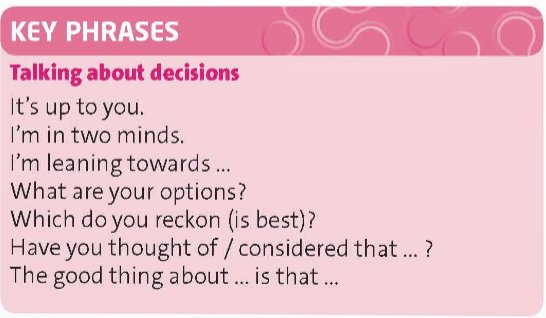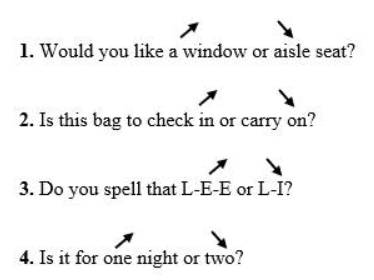Decide whether these key phrases have rising or falling intonation. Then listen and repeat.

Listen and mark the intonation in these questions, using  (rising intonation) or
(rising intonation) or  (falling intonation). Then practise saying them in pairs.
(falling intonation). Then practise saying them in pairs.
1. Do you want to go to university?
2. Have you talked with your parents about your plans?
3. How much does it cost to study at university?
4. What's your favourite subject at school?
Tham khảo:
1. Do you want to go to university?
2. Have you talked with your parents about your plans?
3. How much does it cost to study at university?
4. What's your favourite subject at school?
Mark the intonation in these questions, using  (rising intonation) or
(rising intonation) or  (falling intonation). Listen and check. Then practise saying them.
(falling intonation). Listen and check. Then practise saying them.
1. Should we report bullying to teachers or speak to our parents first?
2. Is this social awareness campaign about poverty or crime?
3. Have you ever experienced any physical, verbal, or social bullying?
4. Do you worry about peer pressure, body shaming, or bullying?
1. Should we report bullying to teachers 
(Chúng ta nên báo cáo hành vi bắt nạt với giáo viên hay nói chuyện với cha mẹ trước?)
2. Is this social awareness campaign about poverty 
(Đây có phải là chiến dịch nâng cao nhận thức xã hội về nghèo đói hay tội phạm không?)
3. Have you ever experienced any physical 

(Bạn đã bao giờ bị bắt nạt về thể chất, lời nói hoặc xã hội chưa?)
4. Do you worry about peer pressure 

(Bạn có lo lắng về áp lực của bạn bè, sự xấu hổ về cơ thể hoặc bắt nạt không?)
Mark the intonation, using  (falling intonation) or
(falling intonation) or  (rising intonation). Then listen and check. Practise saying the sentences in pairs.
(rising intonation). Then listen and check. Practise saying the sentences in pairs.
1. Is this an example of negative peer pressure or bad decision-making?
2. Have you ever experienced physical or verbal bullying?
3. Is the most serious issue cutting down trees, hunting wild animals, or littering?
4. ls your awareness campaign going to focus on social issues, environmental problems, or educational themes?
5. Cutting down forests is destroying the earth's ecosystems, isn‘t it? Governments should stop deforestation.
6. You have been to Cuc Phuong National Park, haven’t you? - No, I haven't.
7. Buying products made from wild animals ls not good, isn’t it? We shouldn’t do it.
8. People don’t want to harm the environment, do they? But they do so little to protect it, don’t they?
1. Is this an example of negative peer pressure 
(Đây có phải là một ví dụ về áp lực tiêu cực từ bạn bè hoặc việc ra quyết định tồi không?)
2. Have you ever experienced physical 
(Bạn đã bao giờ bị bạo lực ngôn từ hoặc thể xác chưa?)
3. Is the most serious issue cutting down trees 

(Vấn đề nghiêm trọng nhất là chặt cây, săn bắt động vật hoang dã hay xả rác?)
4. ls your awareness campaign going to focus on social issues 
(Chiến dịch nâng cao nhận thức của bạn có tập trung vào các vấn đề xã hội, vấn đề môi trường hay chủ đề giáo dục không?)
5. Cutting down forests is destroying the earth's ecosystems, isn‘t it? 
(Chặt phá rừng đang phá hủy hệ sinh thái của trái đất phải không? Các chính phủ nên chấm dứt nạn phá rừng.)
6. You have been to Cuc Phuong National Park, haven’t you? 
(Bạn đã từng đến vườn quốc gia Cúc Phương phải không? - Chưa, tôi chưa từng đến.)
7. Buying products made from wild animals ls not good, isn’t it? 
(Mua các sản phẩm làm từ động vật hoang dã là không tốt phải không? Chúng ta không nên làm điều đó.)
8. People don’t want to harm the environment, do they? 
(Mọi người không muốn làm hại môi trường phải không? Nhưng họ làm quá ít để bảo vệ nó phải không?)
Listen and mark the intonation in these sentences, using  (falling intonation) or
(falling intonation) or  (level-rising intonation). Then practise saying them in pairs.
(level-rising intonation). Then practise saying them in pairs.
1. Hoi An Ancient Town became a World Heritage Site in 1999.
2. Turn on the light. It’s dark in here.
3. Cultural heritage may include temples, pagodas, and monuments.
4. Tourists can visit the pedestrian streets in Ha Noi.
1. Hoi An Ancient Town became a World Heritage Site in 1999 
(Phố cổ Hội An được công nhận là Di sản thế giới năm 1999.)
2. Turn on the light 

(Bật đèn đi. Ở đây tối.)
3. Cultural heritage may include temples 


(Di sản văn hóa bao gồm đình, chùa, và các công trình.)
4. Tourists can visit the pedestrian streets in Ha Noi 
(Du khách có thể tham quan phố đi bộ ở Hà Nội.)
Tham khảo
1. Hoi An Ancient Town became a World Heritage Site in 1999 
2. Turn on the light 

3. Cultural heritage may include temples 


4. Tourists can visit the pedestrian streets in Ha Noi 
Listen and mark the intonation in these questions, using  (rising intonation) or
(rising intonation) or  (falling intonation). Then practise saying them in pairs.
(falling intonation). Then practise saying them in pairs.
1. Are you interested in studying at university?
2. How much is the fee for this cooking course?
3. Did you attend the education fair?
4. Who would like to train to become a tour guide?
Mark the intonation in the following sentences using  (falling intonation),
(falling intonation),  (rising Intonation),
(rising Intonation),  (level-rising intonation), or
(level-rising intonation), or  (fall-rise intonation). Then listen and check. Practise saying them in pairs.
(fall-rise intonation). Then listen and check. Practise saying them in pairs.
1. Could you show me the way to the Museum of History?
2. What do you want to see during the festival?
3. How about going on a boat trip this weekend?
4. I want to go to a vocational school after finishing secondary school.
5. Would you like to go to the cinema with me?
6. Why don’t you join the cooking classes?
7. During my trip, I visited a historic monument, an ancient pagoda, and an old village.
8. Are you good at time management?
1. Could you show me the way to the Museum of History?
2. What do you want to see during the festival?
3. How about going on a boat trip this weekend?
4. I want to go to a vocational school after finishing secondary school.
5. Would you like to go to the cinema with me?
6. Why don’t you join the cooking classes?
7. During my trip, I visited a historic monument, an ancient pagoda, and an old village.
8. Are you good at time management?
Listen and repeat. Use rising and falling intonation.
(Nghe và nhắc lại. Sử dụng ngữ điệu tăng và giảm.)

Listen and mark the intonation in the following sentences, using  (falling intonation) or
(falling intonation) or  (level-rising intonation). Then practise saying them in pairs.
(level-rising intonation). Then practise saying them in pairs.
1. The trip to Hoi An Ancient Town was amazing.
2. Turn off the air conditioner. It wastes too much electricity.
3. A boat tour is the best way to experience wildlife habitats.
4. ln Ha Long Bay you can go swimming, diving, and fishing.
1. The trip to Hoi An Ancient Town was amazing 
2. Turn off the air conditioner 

3. A boat tour is the best way to experience wildlife habitats 
4. ln Ha Long Bay you can go swimming 


Mark the intonation in the question tags, using rising intonation or falling intonation. Then listen and check. Practise saying the conversations in pairs.
1. A: Sorry, I didn’t hear my alarm this morning.
B: So, you were late again, weren't you?
2. A: I couldn't watch the match last night. We won, didn’t we?
B: Yes, we did.
3. A: There are several ecosystems that can be found in Viet Nam.
B: Yes. Viet Nam is biologically diverse, isn't it?
4. A: We are running out of fossil fuels, aren't we?
B: Yes, we are. We should find more alternative sources of energy.
5. A: People should stop damaging the environment, shouldn't they?
B: Yes, I agree with you.
Listen and repeat. Pay attention to the falling ( ) or rising (
) or rising ( ) intonation in each of the following questions.
) intonation in each of the following questions.
1. Did anyone go? 
2. Is academic education important nowadays? 
3. What are your plans for the future? 
4. When does the course start? 